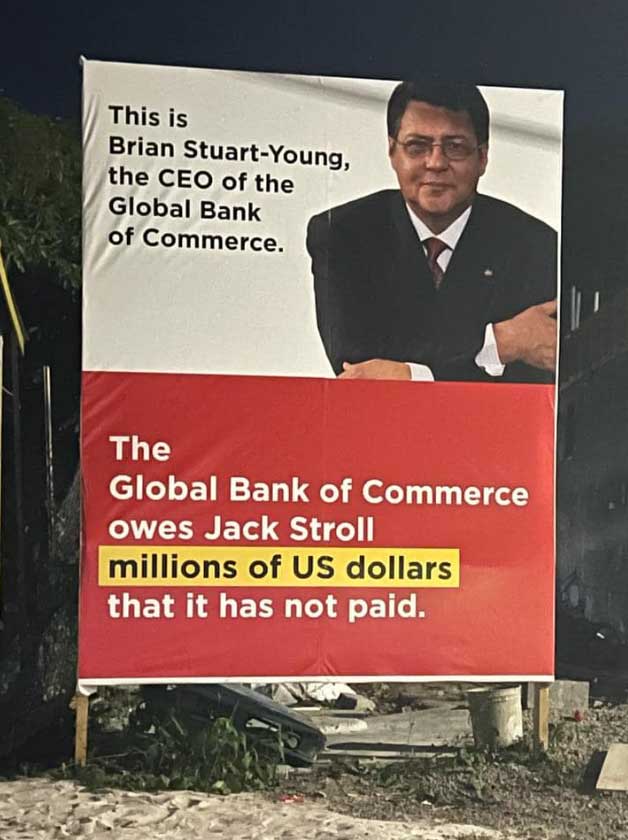ANTIGUA | From Stanford to Stuart-Young: Antigua's Silent FSRC Financial Scandals

ST. JOHN’S, Antigua, May 17, 2025 - In a country still haunted by the ghosts of the Stanford Ponzi scheme, history appears to be repeating itself with alarming familiarity.
The Financial Services Regulatory Commission (FSRC) and its Chief Regulatory Officer, Paul Ashe, have retreated into an inexplicable cone of silence as the Global Bank of Commerce (GBC) faces a court-ordered deadline to pay a long-suffering depositor or see its CEO behind bars.
The watchdog has become a lapdog, seemingly muzzled in the face of a banking crisis that threatens to further tarnish Antigua and Barbuda's already fragile reputation as a financial center.
GBC's CEO Brian Stuart-Young—who conveniently doubles as Antigua's Ambassador to China—missed a February deadline to repay Jack Stroll, a depositor who has been fighting since 2020 to retrieve his funds.
The High Court has now issued an ultimatum: pay up by Monday, May 19, 2025, or face 21 days imprisonment. Fifty thousand nine hundred and fifty dollars and thirty-two cents, Eastern Caribbean currency ($50,950.32) is the amount by which Brian Stuart-Young and the Global Bank of Commerce (GBC) reportedly have breached a Court Order to pay depositor Jack Stroll by Friday, May 16.
Stuart-Young was also fined $3,000 for wasting the court's time—a paltry sum compared to Stroll's trapped deposits.
According to Real News Antigua, "Last month, High Court Judge Rene Williams had ordered that the sum still owed on Stroll's US-currency deposits – US$341,130.07, or EC$921,921.07 – should be satisfied by Stuart-Young and the offshore bank by 5 p.m. yesterday.
"However, according to sources close to this matter, funds totalling $870,970.75 were deposited directly into Stroll's account at the Caribbean Union Bank (CUB) – instead of being routed through his lawyer’s chambers – and in the local currency, rather than in United States dollars, as was expected.
"Two deposits had cleared CUB by the end of the business day, with another for $300,000 “pending,” reports say.
"The sources tell REAL News that an affidavit was also filed at the High Court late yesterday, reportedly by Stuart-Young’s counsel, claiming there had been a “miscalculation” of the sums to be paid.
"As this matter has dragged on for almost five years, residents have begun to question the role of the Financial Services Regulatory Commission (FSRC) in the apparent debacle, since the CEO had admitted earlier that the bank was not able to satisfy Stroll’s demands for payment due to its liquidity challenges.
"These challenges, he claimed, had also affected his own personal ability to make the scheduled payments.
"In the meantime, repayments of Stroll’s Sterling accounts with the GBC have been scheduled for July 30 and September 30, in the amounts of 750,000 and approximately 902,000 Great Britain Pounds, respectively.
"The sources report that the depositor has spent between US$2 and 3 million for legal services, so far, and Stuart-Young and GBC are expected to compensate him and to pay court fees, as well.
When confronted in court, Stuart-Young's semantic gymnastics were on full display, denying the bank was insolvent while admitting to "liquidity issues"—a distinction without a difference to depositors unable to access their money.

Their silence is not just deafening; it's damning.
Where is the FSRC's assessment of GBC's financial health? What steps have they taken to protect depositors?
Does the regulatory body feel no obligation to report to the public on an institution that prominently displays its FSRC license as a badge of legitimacy?
The questions pile up while answers remain scarce.
And where is Prime Minister Gaston Browne in all this?
The man who claims to love Antigua and Barbuda with every fiber of his being seems strangely unmoved by this latest threat to the nation's financial credibility.
His outrage—so readily displayed on other matters—is nowhere to be found. His sense of financial propriety and fair play appears to have taken an extended holiday.
The shadows of impropriety grow longer when examining the cozy relationship between Browne and Stuart-Young.
This long-standing association has raised eyebrows, especially as Browne publicly defended Stuart-Young, calling him "not a crook" and a "decent man"—peculiar descriptors that seem more fitting for a character reference in a courtroom than reassurance from a head of government.
Even more troubling is how Browne has rewarded Stuart-Young with a cushy ambassadorship to China—a prestigious post that conveniently keeps him far from local scrutiny while waiting for the financial winds to die down.
One must wonder: is this diplomatic appointment meant to serve Antigua's interests abroad, or simply to shield a loyal ally from the storm at home?
The Prime Minister's apparent indifference to a brewing financial scandal comes as Opposition Leader Jamale Pringle has called for him to step aside until matters such as this—along with the troubling Alfa Nero yacht debacle—are properly adjudicated in the courts.
Browne's response? The same deafening silence that characterizes his regulatory agency's approach to the GBC crisis.
The Opposition United Progressive Party (UPP) has seized on the case as evidence of lax oversight of the offshore financial sector under the Labour administration.
When a billboard highlighting GBC's debt to Jack Stroll was errected on Whenner Road, replete with Browne's defense of Stuart-Young, the Development Control Authority swooped in with remarkable efficiency—dismantling it within 24 hours on grounds it was "defamatory." If only financial regulators moved with such alacrity when depositors' funds were at stake.
Has shame become a foreign concept in the corridors of power? Does the reputation of "beloved" Antigua and Barbuda mean nothing when weighed against personal and political allegiances? These questions hang in the air, unanswered, as the clock ticks toward Monday's deadline.
The echoes of the Allen Stanford debacle ring disturbingly loud. Former FSRC CEO Leroy King is currently serving a 10-year prison sentence for his role in that $7 billion fraud, having allowed Stanford's operation to write misleading responses to regulatory inquiries. The scheme's collapse devastated countless Antiguan and international investors.
The FSRC, scarred by this history, should be bending over backward to demonstrate its commitment to rigorous oversight. Instead, its passive stance in the GBC affair suggests the lessons of Stanford remain unlearned.
For an agency tasked with maintaining "market confidence" and "the reputation of Antigua and Barbuda as a financial centre," the FSRC's failure to proactively address this situation represents a dereliction of duty that borders on negligence.
As Monday's deadline looms, more than Stuart-Young's freedom hangs in the balance. The credibility of Antigua and Barbuda's financial regulatory framework—and by extension, its viability as an international financial center—faces yet another test. So far, the regulators appear content to fail it by default.
The question now is not just whether Stroll will get his money, but whether the FSRC will ever emerge from its self-imposed silence to fulfill its mandate and protect the public interest.
For a regulatory body already tainted by past failures, this latest abdication of responsibility may prove the final blow to its already fragile credibility. And for Prime Minister Browne, his continued silence speaks volumes about where his priorities truly lie.
-30-
